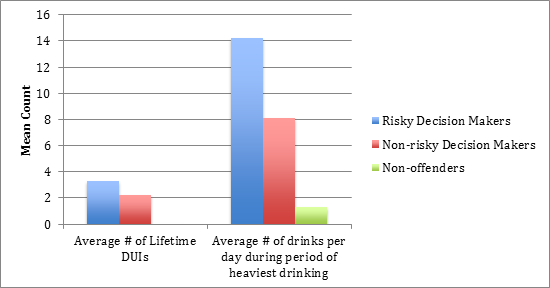The WAGER, Vol. 20(13) – Driving under the influence: A dangerous gamble
People who decide to drive under the influence of intoxicants (DUI) risk hurting themselves or others. DUI clearly represents poor decision-making. Although it might seem logical that all DUI offenders struggle to make good decisions, some might be especially impaired in this area. If so, they might benefit from treatment that specifically targets this limitation so that they do not keep reoffending. This week, as part of our Special Series on Driving under the Influence, The WAGER examines whether DUI offenders with impaired decision making skills are especially likely to drink heavily and re-offend (Bouchard et al., 2012).
Methods
- Twenty-three repeat DUI offenders and 19 people with no previous DUI convictions completed a mental health assessment (i.e., the Composite International Diagnostic Interview; CIDI; Bouchard et al., 2012) and the Iowa Gambling Task (i.e., IGT; Bouchard et al., 2012), an objective assessment of risky decision-making.
- The researchers separated the DUI offenders into two groups based on how they performed on the IGT: a non-risky decision group (n=13) and a risky decision group (n=10).
- Then the researchers compared the two DUI offender groups in terms of DUI history (i.e., number of past DUI convictions) and alcohol use history. They compared both groups against non-offenders in terms of heavy drinking days.
Results
- 100% of repeat DUI offenders in the risky decision group qualified for an alcohol disorder diagnosis. 70% of those in the non-risky decision group did so.
- Those in the risky decision group also had significantly more DUI convictions and reported heavier drinking on drinking days when compared to those in the non-risky decision group. Both groups reported heavier drinking than the non-offender group (see Figure 1).

Figure. Average number of lifetime DUI arrests and alcohol consumption during heaviest period of drinking between three groups: repeat DUI offenders with risky decision-making, repeat DUI offenders with non-risky decision-making, and non-offenders. (Adapted from Bouchard et al, 2012). Click image to enlarge.
Limitations
- The sample size is extremely small (n = 42), which could impact the stability of the findings.
- This sample was recruited from a singular Canadian providence and the results, therefore, may not be applicable to or represent the DUI recidivist population in other areas.
- This study is a self-reported recall study and therefore its results may not be useful in predicting future DUI recidivism.
Conclusion
This research suggests that DUI is especially intractable among offenders with impaired decision-making skills. In the long term, those whose decision-making skills are especially impaired might not respond to traditional treatments which focus on substance use disorders. Instead, it could be necessary to develop specialized treatment that improves decision-making. More research is necessary to further understand the role of risky decision-making in DUI behavior and recidivism.
— Layne Keating
What do you think? Please use the comment link below to provide feedback on this article.
References
Bouchard, S. M., Brown, T. G., & Nadeau, L. (2012). Decision-making capacities and affective reward anticipation in DWI recidivists compared to non-offenders: a preliminary study. Accident; Analysis and Prevention, 45, 580–587. http://doi.org/10.1016/j.aap.2011.09.012